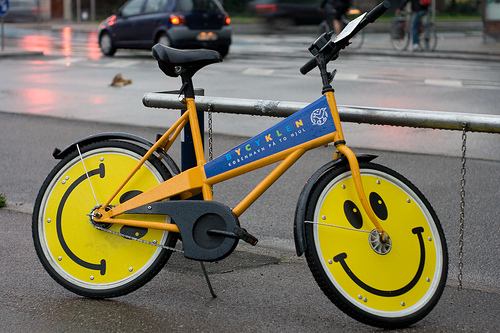Gift Economy Bicycles Make A Comeback

In 1964, Luud Schimmelpenninck, proposed a "white bicycle plan" for Amsterdam to close all central Amsterdam to all motorised traffic, and buy 20,000 white bikes per year that would be public property and free for everybody to use. Despite being rejected by city authorities, the Provos group decided to go ahead with it anyway. The city soon passed a law forbidding citizens to leave bikes without locking them; the Provos then equipped them all with combination locks and painted the combinations on the bicycles. A month later, most of the bikes were stolen or found in the nearby canal.
However, this bold experiment has initiated many modern day community bicycle programs. In 1974, French city of La Rochelle launched a free bike program -- this time with yellow bicycles -- that was regarded as the first successful bike sharing program (and last year, Paris rolled out with 14,000 free bikes). In 1994, Portland was the first to try with their Yellow Bike Project. After major media attention and resulting vandalism, the program was turned into a more restrictive offering. In 1995, Copenhagen started ByCyklen (the photo above is one of those bikes).
Today, the NY Times reports that there are colleges (University of New England, to name one) that are welcoming freshman with a gift of a $480 bicycle. The hope is that by giving each person a bicycle, they will be more responsible with it and of course, reduce their footprint on the community. While Juniata College in Pennsylvania scraped its two year old bike-share program, couple campuses are trying rental programs and St. Xavier University in Chicago is trying free bikes with GPS systems to track it. :)
From a systemic gift-economy perspective, there are three fundamental issues with sharing freely: (a) tragedy of the commons, (b) inability to scale, (c) lack of incentive to produce/innovate. With bicycles, we see communities reporting problems about citizens not parking the bike properly, we see thefts and vandalism due to a loss of trust at higher scales, and we see government supervision needed to incentivize the program management. But still, people keep trying because (in recent cases) they are desparate to reduce traffic on the streets and a make a statement for sustainability.
One fundamental weakness, in all such programs, is its compulsion to scale immediately and predictably. Of course, the other approach of increasing interconnections within the community and empowering those small-scale networks to share is a longer term -- perhaps even multi-generational -- solution. Still, I sense that the Internet could be a great asset in facilitating this progress. Consider CouchSurfing (whose founder is well aware of CF's work too :)) -- online trust network, and offline sharing of resources. And the proof is really in the pudding: tens of thousands of people use it everyday, it preserves trust despite scale, it has practically no overhead and is volunteer-run.
Someone recently asked me about the gift-economy and I wrote, "Being sedated by the dominant paradigm, all of us get accustomed to reducing our innovative ideas into specialized categories. But in fact, it's all quite inter-related. As you look deeper into the gift-economy, it is the basis of how monastaries have survived for centuries; it is the basis of indigenous cultures across all continents; it is the basis of how nature itself operates. So I've definitely found it to be quite deep. :) The curious part is that it needs strong connectivity -- and this can happen when we're aware of the inner-net, or more superficially, if we happen to live in the times of the Internet. :) Our work seems to be to leverage the Internet times to support inner-net growth."
And then, perhaps, it won't be so hard to implement bike-sharing programs.
Posted by Nipun Mehta on Oct 22, 2008
SHARE YOUR REFLECTION
2 Past Reflections


On May 12, 2009 Bike Mike wrote:
A friend told me about this page with the cool looking smiley face wheel bike.
I cycle in two Multiple Sclerosis bike tours here in New Jersey USA. I may be blind and deaf. Does not stop me from cycling all over and for a great cause. I can not drive. So my car is my bicycle . . . or bicycles. The engine is my legs. Food is my fuel. All I need. Cheaper then fixing a car.
ENJOY YOUR 2009 SUMMER ! ! ! ! !
MS cyclist 1990 to 2009
2002 olympic torchbearer


On Nov 3, 2008 Fred Hsu wrote:
Post Your Reply